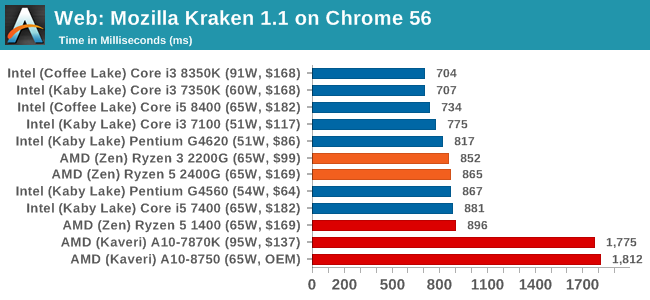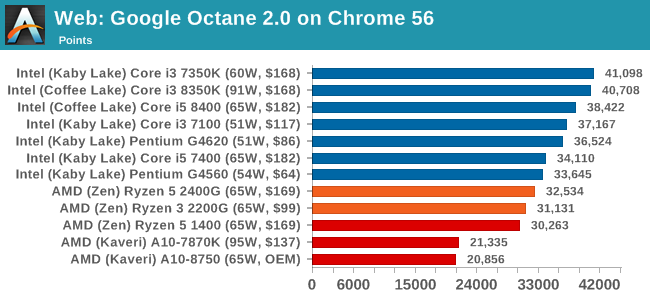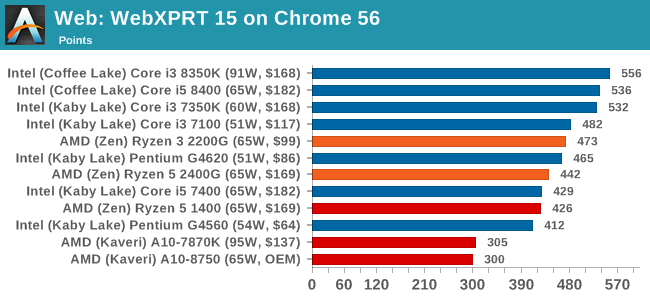Marrying Vega and Zen: The AMD Ryzen 5 2400G Review
by Ian Cutress on February 12, 2018 9:00 AM ESTBenchmarking Performance: CPU Web Tests
One of the issues when running web-based tests is the nature of modern browsers to automatically install updates. This means any sustained period of benchmarking will invariably fall foul of the 'it's updated beyond the state of comparison' rule, especially when browsers will update if you give them half a second to think about it. Despite this, we were able to find a series of commands to create an un-updatable version of Chrome 56 for our 2017 test suite. While this means we might not be on the bleeding edge of the latest browser, it makes the scores between CPUs comparable.
All of our benchmark results can also be found in our benchmark engine, Bench.
Mozilla Kraken 1.1: link
Kraken is a Javascript based benchmark, using the same test harness as SunSpider, but focusing on more stringent real-world use cases and libraries, such as audio processing and image filters. Again, the basic test is looped ten times, and we run the basic test four times.

With the newer high-performance cores, AMD gets a fair crack at benchmarks like Mozilla, where it historically lagged behind with its Bulldozer-family architecture.
Google Octane 2.0: link
Along with Mozilla, as Google is a major browser developer, having peak JS performance is typically a critical asset when comparing against the other OS developers. In the same way that SunSpider is a very early JS benchmark, and Kraken is a bit newer, Octane aims to be more relevant to real workloads, especially in power constrained devices such as smartphones and tablets.

In recent years, Intel has made strides on its Octane performance. So even with cores and threads, and the sizable jump up from Kaveri, AMD is still behind on this test.
WebXPRT 2015: link
While the previous three benchmarks do calculations in the background and represent a score, WebXPRT is designed to be a better interpretation of visual workloads that a professional user might have, such as browser based applications, graphing, image editing, sort/analysis, scientific analysis and financial tools.











177 Comments
View All Comments
coolhardware - Monday, February 12, 2018 - link
I have been holding on to my Intel 2500K desktop for what seems like forever. It has been a trusty companion but with a TDP of 95W and a dedicated GPU pulling 100W+ I'm looking for something a little less power hungry. AMD seems to have what I've been looking for and the price is right :-)Amazon has the 2400G in stock, http://amzn.to/2BVzSSn and I think I'm going to bite the bullet!
PS does anybody have a mobo recommendation for pairing with the 2400G? (stability is my main concern, probably won't OC since the 2400G should be a nice step up from my 2500K)
zaza - Monday, February 12, 2018 - link
if already have a decent GPU it is better to get the Ryzen 1600 instead. it is only 10 or 20$ more but you will get two extra and 8 extra PCIe lanes. These APU only make sense as a placeholder to get something better, for example building a working PC, then add a dedicated GPU later.haukionkannel - Monday, February 12, 2018 - link
Or this will get you very good office computer, without ever needing external GPU...forgerone - Tuesday, February 13, 2018 - link
EXACTLY!!! This is the market for Ryzen with Vega. Business PC's and Laptops and also economy gaming for the markets that can not afford discrete GPU AIB.coolhardware - Monday, February 12, 2018 - link
Cool, thanks for the tip! How is discrete non-gaming (desktop, Photoshop) GPU power usage these days? I live off the grid and so energy efficiency is a big plus. I do not game much so (SC2 and some lower end Steam games).Also, any suggestions for motherboards for 1600 or 2400G? Again, stability is top criteria for me.
Last question, what's the max number of video outputs for the 2400G? Thx!
coolhardware - Monday, February 12, 2018 - link
PS I currently have a GTX 960. It does look like a step down versus the 2400G, as ~1030 (similar benchs to 2400G) is quite a bit lower speed than a 960:http://gpu.userbenchmark.com/Compare/Nvidia-GTX-96...
Cellar Door - Monday, February 12, 2018 - link
The 960 is 2-3x the performance of this.Samus - Monday, February 12, 2018 - link
GTX960 is a $200+ GPU. It's substantially faster than any integrated graphics and probably will be for the next few years.msroadkill612 - Tuesday, February 13, 2018 - link
" I live off the grid and so energy efficiency is a big plus." - apuS are exactly what you should be using.WorldWithoutMadness - Monday, February 12, 2018 - link
then might as well wait for ryzen+ version.Seriously AMD need to release something akin to NUC using the Raven Ridge. They can rake quite a lot of market with that. I will change my office's PCs with those, better GPU and comparable CPU.